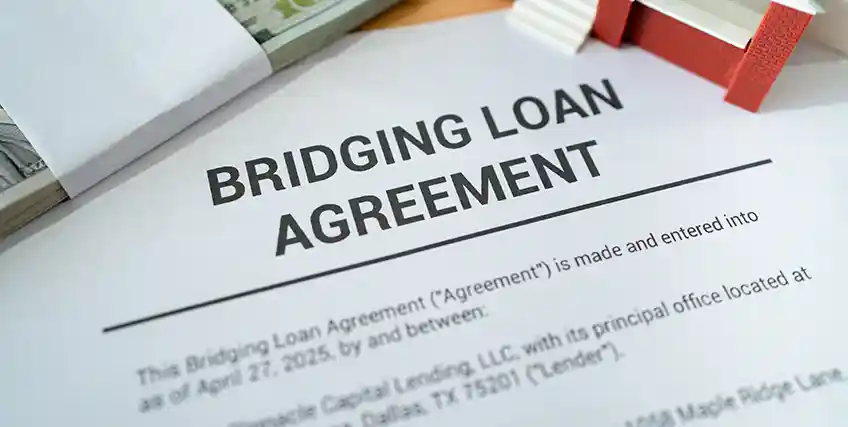Need Cash in 48 Hours? Fast Bridging Loans Could Be the Answer
December 24, 2025 | Last Updated on: December 24, 2025

Unexpected costs in a business don’t wait for your finances to catch up. Sometimes, a small business faces urgent needs that require fast cash. This is where fast bridging loans come into action.
These are short-term financing options that are designed to cover immediate funding gaps. These fast bridging loans can give you the money you need quickly and with fewer delays than a traditional mortgage. These loans offer reliability when conventional loans fall short.
Let’s break down how fast bridging loans work, how they differ from traditional loan options, and who benefits from them. We’ll also look at why fast bridge financing is gaining momentum in the U.S. property and business landscape.
What Are Fast Bridging Loans
Fast bridging loans are a type of short-term loans that are used to bridge financial gaps. These quick loans are usually secured by residential properties or commercial properties. Moreover, this fast bridge financing is known for its speed, whereas traditional loans can take up to weeks or months.
These loans are quite popular for urgent property transactions, sudden expenses, or refinancing needs. Most borrowers use them before switching to long-term financing. Therefore, the market for bridging fast loans is growing among investors and small business owners who need to act fast in their businesses.
The functionality of these loans is simple: the lender provides funds based on the property’s value, and the borrower repays once permanent financing arrives. As a result, we can say that fast bridging loans stand out because of their accessibility, speed, and fewer restrictions.
Additionally, a small business owner may qualify for quick bridge financing with an imperfect credit history due to the value of their assets.
Who Needs Fast Bridging Loans
Fast bridging loans are an ideal business financing option for those facing time-sensitive financial needs. This happens especially when delays could result in lost opportunities or penalties. However, these loans are not only used for urgent business needs but also for resolving financial challenges during refinancing or construction.
Here are some common profiles who can use fast bridging loans:
- Property investors buying a new property before selling the current one.
- Homeowners who are involved in buy-to-let projects.
- Small business owners funding renovations or refurbishment.
- Developers who are stuck in mid-project without any funding.
- Entrepreneurs securing last-minute inventory or covering emergency payroll.
Let’s understand this in a better way. A restaurant chain wants to complete all its renovations before a major holiday season. They can apply for fast bridging loans to cover these expenses.
Moreover, they had a clear exit strategy by refinancing with a local credit union and repaid their loan on time and boosted seasonal sales.
Benefits of Using Fast Bridging Loans
Fast bridging loans typically offer flexible financing and instant access to working capital. Here’s what makes them effective:
- Quick Disbursal: These loan options release funds rapidly, unlike bank loans that may require a few months.
- Versatile Usage: Fast bridging loans can be used for a variety of business needs such as property development, urgent real estate deals, or improving cash flow.
- No Lengthy Underwriting: These loans come with a faster loan application process due to simpler credit history checks. Here lenders focus more on the asset than the borrower’s credit.
- Exit Strategy Support: You can easily repay these loans through refinancing, property sale, or development finance.
- Flexible Repayment Terms: Lenders offer custom timelines for these loans that suit your financial situation. This flexibility is important for small business owners.
- Secured Borrowing: Fast bridging loans offer great loan-to-value (LTV) ratios that can provide significant capital. LTVs are often calculated during the valuation stage.
How Fast Bridging Loans Work
Fast bridging loans are built for emergency needs. Whether you’re closing on a property or navigating a temporary shortfall, the speed of these loans makes them ideal for scenarios where timing is everything.
Here’s how these loans work step-by-step for small business owners or property buyers navigating tight timelines and funding pressures. Understanding these steps can help you prepare better and move quickly when the opportunity or need arises.
- Loan Application: To apply for these bridge loans, you need to submit necessary documents about your property finance needs. These usually include title deeds, ID, and basic income proof.
- Valuation: Lenders assess the loan-to-value (LTV) ratio based on the property. Higher LTVs may reduce your chances and often come with higher interest rates.
- Underwriting: This includes a soft credit check of your credit score, asset value, and a clear exit strategy. Many lenders don’t require full income verification for these loans.
- Approval and Funding: If you get approved for fast bridging loans, the funds get disbursed with minimal upfront requirements. Hence, you can receive funds in a few business days.
Important Factors to Consider Before Applying for Bridge Loans
Before considering fast bridging loans, consider the following factors:
- Interest Rates: These loans usually carry higher interest rates than long-term options since you’re paying for speed and flexibility.
- Repayment Plan: A clear exit strategy is essential to apply for these loans. You should know how you’ll settle the loan amount.
- Fees and Charges: Pay attention to exit fees, valuation costs, legal fees, and others. There are lenders who may charge an application fee as well for these loans.
- Collateral Risk: These loans are often secured by residential or commercial property, so missed payments could have severe consequences.
- Loan Term: These are short-term loans ranging from a few months to less than a year.
How to Qualify for Fast Bridging Loans
Fast bridging loans typically require less paperwork than traditional loans. This helps speed up the funding process. However, you’ll need to be organized for a smoother experience.
To secure fast bridging loans, you’ll typically need:
- Eligible Property: You must have valid residential or commercial property with sufficient value to apply for these loans.
- Equity: A strong LTV ratio improves the chances of bridge loans approval.
- Repayment Structure: You need to have a defined exit strategy like selling your new home or refinancing through long-term financing.
- Clean Financials: There are some lenders who often overlook credit scores. However, having decent financials can speed up the loan application process.
Best Use Cases of Fast Bridging Loans
Fast bridging loans serve a variety of urgent needs across residential, commercial, and investment markets. Their utility extends beyond simple transactions, offering support during financial disruptions or time-critical investments.
Many borrowers turn to these loans when facing unexpected hurdles or to seize time-sensitive opportunities in real estate and business:
- Residential bridging loans: These are ideal for homeowners who need a solution between buying and selling. These loans ensure that you don’t lose your next home.
- Commercial bridging loans: These loans help fund urgent commercial property deals or business expansions. They’re often useful for office, retail, or industrial spaces.
- Development finance: These can assist with construction costs when funding gets delayed to keep your projects on track.
- Buy-to-let purchases: They also enable fast acquisition before long-term financing is in place.
- Refurbishment and repairs: Quick fixes or upgrades to enhance a property's value pre-sale. Also helpful after unexpected damage.
- Auction property purchases: Often require cash within days. Fast bridging loans make that possible with minimal processing time.
- Bridge during refinance: Close gaps while transitioning between financing structures. Ideal if you’re switching lenders.
Conclusion
When time is tight, fast bridging loans provide a lifeline. With flexible finance solutions, they offer quicker access than traditional banks. These loans work because they respect urgency.
Whether you’re securing a new property, managing urgent property transactions, or dealing with a refurbishment, this form of short-term financing fills the gap. Business owners and property buyers alike are discovering how fast bridging loans fit their goals.
If you’re stuck between funding rounds or waiting for property sales to complete, these loans provide breathing space. With the right exit strategy, fast bridging loans become a smart solution.
Disclaimer: Bridging loans should be evaluated carefully. Always consult a qualified advisor before committing to any loan product.
FAQs About Fast Bridging Loans
What are fast bridging loans used for?
Fast bridging loans are often used to manage cash flow during property transitions or business expenses. They can also support urgent real estate purchases or cover temporary funding gaps. However, usage tends to vary depending on the borrower's needs and available finance options.
How quickly can I get a fast bridging loan?
The funding process usually moves faster than traditional loans. Some borrowers receive funds within days, while others may take slightly longer. However, it often depends on the lender and how quickly documentation is completed.
Do I need good credit to qualify for fast bridging loans?
A good credit score may help, but it is not always necessary. Many lenders prioritize property value and exit strategy over credit. These requirements can change based on the loan type and lender policy.
Are fast bridging loans regulated?
Many lenders are overseen by the Financial Conduct Authority (FCA). This can offer added transparency and borrower protection. However, regulation may vary based on the type of bridging finance.
What are the risks of fast bridging loans?
Fast bridging loans typically come with higher interest rates and strict deadlines. If repayment is delayed, you may risk losing your secured property. Therefore, it’s wise to evaluate the risks and repayment terms before applying.
Frequent searches leading to this page
Term Loans are made by Itria Ventures LLC or Cross River Bank, Member FDIC. This is not a deposit product. California residents: Itria Ventures LLC is licensed by the Department of Financial Protection and Innovation. Loans are made or arranged pursuant to California Financing Law License # 60DBO-35839




